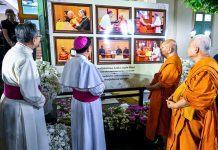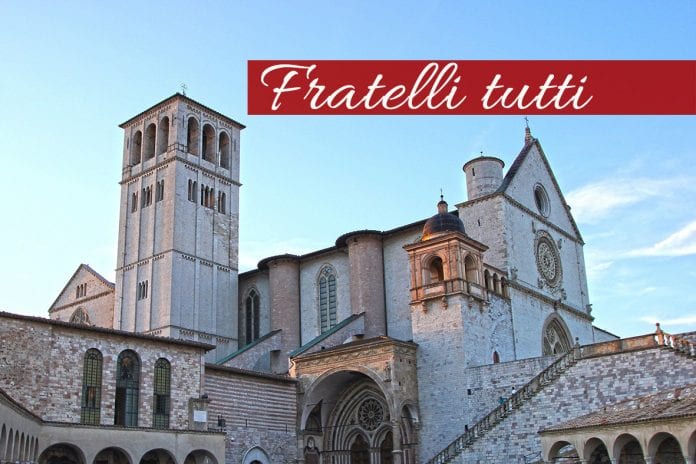Assisi (Italy). On 3 October 2020, “the eve of the Feast of the Poverello”, at the tomb of St. Francis, in the Crypt of the Lower Basilica of Assisi, Pope Francis signed the Encyclical Letter “Fratelli tutti” on fraternity and social friendship.
The signing of the copies in different languages took place on the altar above the tomb of St. Francis (1182-1226), at the end of a Eucharistic celebration characterized by Franciscan simplicity, with a reduced presence of men and women religious.
“I offered it to God at the tomb of St. Francis, from whom I drew inspiration as for the previous Laudato sì”, explained the Supreme Pontiff, who with the Encyclical on the theme of human fraternity, the third since the beginning of his pontificate, stands in continuity with his predecessors: “The signs of the times clearly show that human fraternity and care for creation form the only way towards integral development and peace, already indicated by the Holy Popes John XXIII, Paul VI, and John Paul II (Angelus 4 October 2020).
The Encyclical, made public on 4 October 2020 on the feast of the Patron Saint of Europe, begins with the words with which St. Francis addressed all his brothers and sisters – “Fratelli tutti” – inviting “to a love that goes to beyond the barriers of geography and space.”
Pope Francis interprets today the same desire that animated the Saint whose name he chose for his pontificate: “We dream as one humanity, as travelers made of the same human flesh, as children of this same land which hosts all of us, each with the richness of faith or convictions, each with their own voice, all brothers and sisters!”
Two episodes inspire Pope Francis in the drafting of the Encyclical Letter, giving it an ecumenical character: the visit of St. Francis to Sultan Malik-al-Kamil in Egypt, which testifies to his desire to express the love of God by living a humble and fraternal ‘submission’, even towards those who did not share his faith; and his meeting with Grand Imam Ahmad Al-Tayyeb in Abu Dhabi, on February 4, 2019, to sign the “Document on human fraternity for world peace and common co-exsitence”.
In the introductory part, the Pope tells of the impact that the Covid-19 pandemic had in his reflection, highlighting the false certainties and the inability to act together: “Despite being hyper-connected, a fragmentation has occurred that has made it more difficult to solve the problems that affect us all.”
In the first of the 8 chapters that compose it, entitled “The shadows of a closed world”, Pope Francis, starting from an analysis of the trends of the current world that hinder the development of universal fraternity – such as the crumbling of dreams of unity, the end of historical conscience, the lack of a global project, the affirmation of the throwaway culture, the lack of respect for human rights, the different forms of conflicts, globalization, and progress without a common route, pandemics and other scourges of history, migratory phenomena, the illusion of communication, – comes to the invitation to walk in hope, which “knows how to look beyond personal comfort, the small securities and compensations that narrow the horizon, to open up to great ideals that make life more beautiful and dignified.”
To overcome these shadows, the Pope indicates the way out in the figure of the Good Samaritan (Lk 10: 25-37), to whom he dedicates the second chapter, encouraging openness to others, to promote paths of peace, to start processes of healing and renewed encounter as brothers and sisters.
The Encyclical Letter “Fratelli Tutti” concludes with the appeal for peace, justice, and universal fraternity that emerged from the meeting with the Great Imam Ahmad Al-Tayyeb, with reference to the figure of Charles de Foucault, “the universal brother” and with the Prayer to the Creator and the Ecumenical Christian Prayer.




















